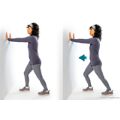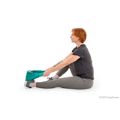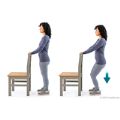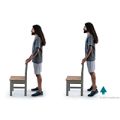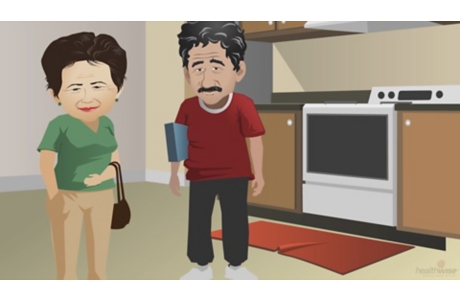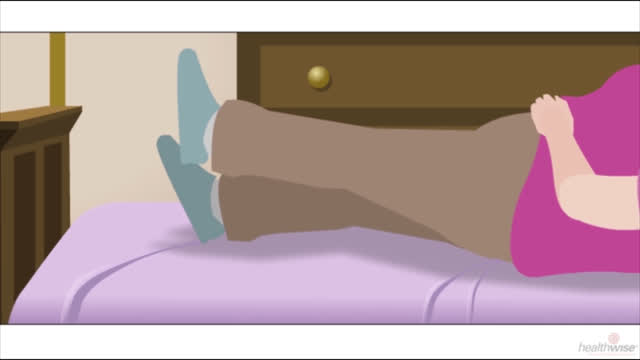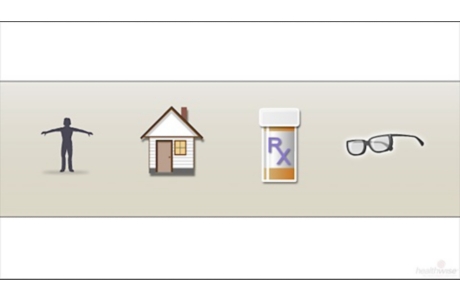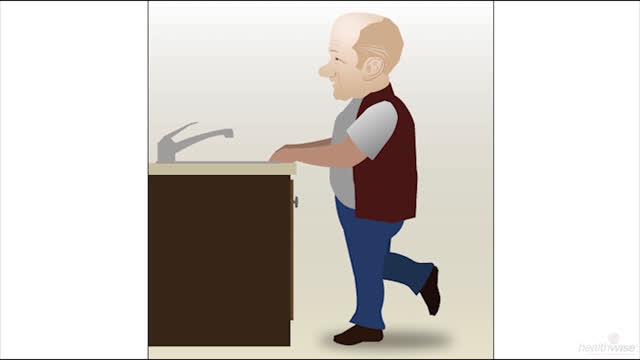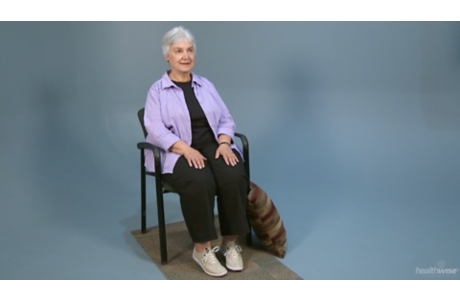Preventing Falls: Exercises for Strength and Balance
Overview
As you age, you lose muscle strength, which can make you more likely to fall. Also, your reflexes slow down. This makes it harder for you to regain your balance if you start to fall.
Regular physical activity can help you stay strong. Start slowly, and increase your activity slowly over time. Ask your doctor which exercises are safe for you to do. And let the doctor know if you have any problems doing them.
How do you do the exercises?
Warm-up exercises
Before you do exercises for strength and balance, it's important to do a few warm-up exercises. Ask your doctor which exercises are safe for you to do.
Start by standing next to the wall, the sink, or a countertop. Or if you prefer, you can sit in a sturdy, straight-backed chair.
- Breathe in and out.
Breathe in deeply through your nose. Lift your arms above your head, and stretch. Lower your arms, and breathe out.
- Do shoulder rolls.
Gently rotate your shoulders up to the ceiling, backward, and down. Then try this movement in reverse. Gently rotate your shoulders up to the ceiling, forward, and down.
- Do calf stretches while you stand or sit.
- To stretch your calves while standing, stretch one leg behind you, with your foot flat on the floor and your toes facing forward. Gently bend your front knee until you feel a stretch in your calf. Hold the stretch for 15 to 30 seconds. Repeat 2 to 4 times with each leg.
- To stretch your calves while sitting down, use a towel. Place your leg out in front of you with your heel on the floor. Hold both ends of the towel and loop the middle of the towel under the ball of your foot. Gently pull the ends of the towel toward you while keeping your knee as straight as you can. Hold the stretch for 15 to 30 seconds. Repeat 2 to 4 times with each leg.
-
March in place.
Stand with a chair in front of you and a wall behind you. If you start to fall, you can use them for support. Standing in a corner will also work. Stand with your feet slightly apart (as you normally stand) and your arms at your side. March in place, lifting your knees high toward the ceiling.
Exercises for strength
To do any of these strength-building exercises, stand up straight and use a counter or sturdy chair for support. Start by doing each exercise a few times. Then work your way up to 8 to 12 times for each exercise.
- Do leg bends.
Bend one knee so your foot comes up behind you and is level with your knee. Slowly lower your foot to the floor. Repeat, using the other leg.
- Do shallow knee bends.
Hold on to the back of your chair. Stand with your knees relaxed and your back straight. Your knees should face the same direction as your toes. Slowly bend your knees. Then raise your body by straightening your knees.
- Do heel raises.
Rise up onto your toes. Hold for a few seconds. Slowly lower your heels to the floor.
- Do leg lifts.
Hold on to the back of your chair. Keeping your legs straight, lift one leg a few inches to the side. Hold for a few seconds. Slowly lower your leg. Repeat on the other side.
- Do a sit-to-stand exercise.
Sit in your chair, with the chair against a wall. Stand up without using your hands. If this is too hard, start by using a pillow on the chair until you get stronger.
Exercises for balance
As people age, they lose muscle strength. This loss of strength can make them more likely to fall. Also, their reflexes slow down. This makes it harder for them to regain their balance if they start to fall.
These exercises can help you with balance. You can start by holding on to the sink, the counter, or the back of your chair with both hands. When that gets easy, hold on with just one hand. Then hold on with just two fingers of one hand. Soon you may be able to do each exercise without holding on with either hand. But it's important that you only try this when you feel that the way you are doing it now has become too easy.
Ask your doctor which exercises are safe for you to do. And let your doctor know if you have any problems doing them.
- Do the one-leg balance exercise.
This exercise has four steps. Remember to relax and take slow, deep breaths. Keep yourself safe by going at your own pace. Trust your instincts, and don't push yourself to do too much too soon.
Hold on to the sink, the counter, or the back of your chair with both hands. Try the first step below. If you can do that one easily, go on to the second step. If not, just do step one of this exercise for now and move on to the next exercise. Keep yourself safe, and go at your own pace.
- First step: Stand on one leg. Balance for as long as you can, working up to 60 seconds on each leg. When you can do this for 60 seconds, try the next exercise.
- Second step: Stand on one leg, and fold your arms across your chest. When you can do this for 60 seconds on each leg, go on to the next exercise.
- Third step: Stand on one leg and hold your arms out to the sides. When you can do this for 60 seconds on each leg, try the next exercise.
- Fourth step: Stand on one leg and fold your arms across your chest with your eyes closed. Balance for as long as you can, working up to 60 seconds on each leg.
- Do the toe-heel balance exercise.
Hold on to the sink, the counter, or the back of your chair with both hands. Stand on your toes, and hold that position for 10 seconds. Then rock back to your heels, holding that position for 10 seconds. Repeat about 5 times.
- Do hip circles.
Hold on to the sink, the counter, or the back of your chair with both hands. Without moving your shoulders or feet, make a big circle to the left with your hips (counterclockwise). After you make 5 circles to the left, make 5 circles to the right (clockwise).
- Do heel-toe walking.
Stand with your left side toward the kitchen counter. You can use the counter for balance if you need to. Place the heel of your left foot in front of the toes of your right foot so the heel and toes touch. Focus on a spot ahead of you, and take a step so that your right heel touches the toes of your left foot. Work up to 20 steps. You can turn around and go in the other direction, with the counter on your right.
Credits
Current as of: July 31, 2024
Author: Ignite Healthwise, LLC Staff
Clinical Review Board
All Healthwise education is reviewed by a team that includes physicians, nurses, advanced practitioners, registered dieticians, and other healthcare professionals.
Current as of: July 31, 2024
Author: Ignite Healthwise, LLC Staff
Clinical Review Board
All Healthwise education is reviewed by a team that includes physicians, nurses, advanced practitioners, registered dieticians, and other healthcare professionals.


